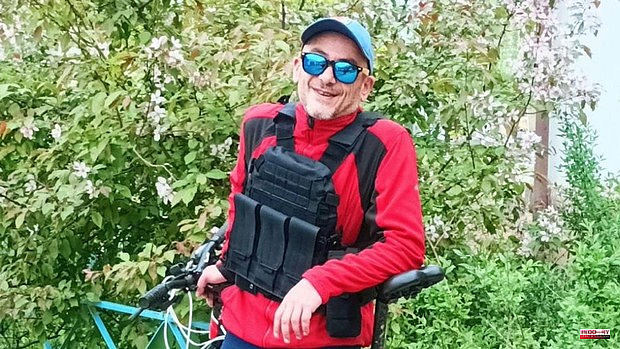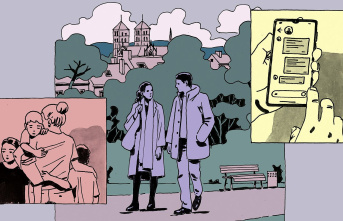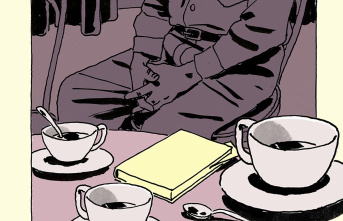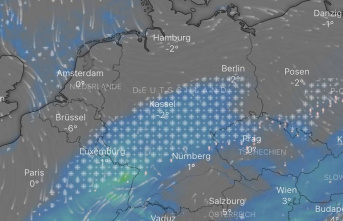My apartment had been affected by an explosion. In my neighborhood, almost every building was destroyed. There was nothing left for me there, I couldn't stay in the city, and I thought that for me, as a cycling tourist, the 65 kilometers between Severodonetsk and Bakhmut were nothing », he explains. Nothing under normal conditions, but in times of war and on one of the most heavily bombed roads in all of Donbass, key to the control of Lugansk and Donetsk that Vladimir Putin longs for, the journey oscillated between feat and suicide.
Aref put on his training clothes, his bulletproof vest and packed his basic documents, his cell phone and charger, cookies and a bottle of water in a small backpack. “From the first moment, I knew that if I had to flee, I would do it on my bicycle.
He believed that the road could not be more dangerous than Severodonetsk, but he was very wrong. For three months, every day he thought he was about to die, but the road almost killed me », he explains to ABC by phone from Dnipro, where he has temporarily taken refuge. "The worst thing is that when I realized the situation, it was too late to turn around, since the bridge I crossed was destroyed shortly after. I could only move forward."
Aref is not exaggerating when he describes the situation in the area. The Russian Army is "wiping Severodonetsk off the face of the earth," the governor of Lugansk, Serhii Gaidai, told The Guardian. The mayor of Kramatorsk, Oleksander Goncharenko, explained days ago that the situation in the city is critical. In Rubizhne, the destruction resembles that of Mariupol, with devastation levels approaching 90 percent, and in Severodonetsk it is estimated that half the city has been annihilated. The same fate is being followed by the neighboring villages, as well as the road itself, a vital artery for supplying the Ukrainian troops from Donetsk. The pro-Russian militias assure that the city is practically surrounded after the capture of four neighboring towns, and that the only way out is a bridge under their control. According to Goncharenko, the Ukrainians planned to blow up the bridge before abandoning their positions to prevent a Russian advance.
The offensive on today's Donbass has intensified in three directions: Liman, Bakhmut and Severodonetsk. Control of the first two would allow Moscow to advance on the Donetsk territory that is still beyond its control, and the third would allow it to complete the conquest of Luhansk. Russia uses aviation and artillery in its usual scorched earth policy, which consists of massive bombardments that crush any sign of life in the area to facilitate the entry of its troops without encountering resistance. According to the Ukrainian Armed Forces, the Russian advance has allowed it to take positions on the road of life - now transformed into the road of death, thanks to intense bombing and artillery combat in the surroundings - which allowed the evacuation of Severodonetsk between the towns of Lisichansk and Bakhmut.
The highway of life took six hours of wild pedaling for Aref, who found himself dodging charred car casings, shell debris, branches, shrapnel, rocks and craters, incinerated battle tanks and all manner of battle remnants. What seemed like "a good idea turned into the worst possible idea," he explains. Next to him, “the bombs fell without stopping. They fired artillery but on five occasions I was surprised by air strikes. I had no choice but to throw myself onto the shoulder and cover my head until the shelling stopped. Two of the times, I thought I didn't tell. But when it was over I would run to my bike and pedal again as if it was the last time I would have the opportunity to do it.
Today, Aref's bike stands at the entrance to a Bakhmut music school that serves as a temporary shelter for those fleeing from across the Donbass to western Ukraine. At its entrance, slices of stale bread dry on a clothesline while two women from the area, their faces exhausted, dig through boxes of donated clothing. Iulia and her mother, Luda, have settled in a room with ten beds where they sleep with her four children, her husband and her brother. "We live in Yakolivka [near Adviidka, south of Donetsk, where heavy fighting is taking place] and the situation is unbearable," muses Iulia, intensely blue eyes and black hair in a ponytail, while three-year-old little Bogdada years, look curious. “For 10 days they have been bombing so intensely that we could not even sleep. On May 15, two neighbors died in a bombardment and we could not notify anyone to collect the bodies because there is no light or coverage », intervenes her mother, sitting in a plastic chair, pulling her hair. "In the end we decided to wait until they stopped bombing to bury them ourselves in the garden."
Mother and daughter know at least three victims in their village, where they have abandoned their cattle and their way of life. "We didn't want to leave because we have everything insured there, but my children scream during the bombardments, it scares us too much," Iulia explains. Like them, dozens of families pass daily through the center managed by Ania, a 34-year-old volunteer. "I can't leave because my mother-in-law is disabled, and like her, all these people need me," he explains while showing the old conservatory transformed into a shelter, where instruments and desks are stacked to make room for 80 beds over five floors. "Women have arrived who had just given birth with their babies a few hours old, born under the bombs," explains the woman while her Labrador follows her everywhere. In total, 800 refugees have passed through the place, an evacuation point from which the displaced are transferred out of the Donbass.
On Tuesday night, Nikolai, the driver of an armored evacuation bus, showed video he had taken inside Liman, near Slaviansk, where Russian forces already control the northern sector. Burning buildings, mountains of rubble and gutted cars made up a common sight in the Donbass. One of the buildings, a multi-storey block of flats, seemed to retain only the façade: its interior seemed to have been sucked out. In the center of Limán, closed to anyone who does not belong to the Armed Forces, as in several surrounding towns, two hundred civilians waited for the possibility of fleeing holding canvas bags and suitcases. "We have filled eleven buses," Nikolai noted. »Many, many people…» The images showed young children, elderly people with mobility difficulties and also injured people evacuated aboard ambulances. In one of them, with homemade armor, there were bullet holes and shrapnel scratches: the two front wheels, as well as the hood, had been blown up.
The Russian presence in Limán puts at risk the future of Sloviansk, a dozen kilometers away, and also of Kramatorsk, 8 kilometers from the former and administrative capital of the Ukrainian Donetsk, subjected to heavy bombing. One of them, on Wednesday around five in the morning, interrupted the electricity supply in some districts of the city, leaving 25,000 people without electricity or water, although the authorities immediately began repairs and the employees hoped to resume service. Electric stoves have become one of the most coveted items in the Donbass after the gas supply was cut off.
"An alarming night in Kramatorsk (...) The enemy is closing in. The danger is no longer there but here, very close to us," the city's mayor said in a message. With the anti-aircraft sirens permanently active, the tension takes hold of a population gripped by uncertainty. On Wednesday more civilians were visible on the streets, all of them in queues: lines in front of the few open supermarkets and pharmacies, queues of cars in front of the few open gas stations, with the pumps literally wrapped in sandbags to prevent a splinter from bursting the place in the air, and lines of people at the points of distribution of humanitarian aid. After stocking up, the population shelters in the cellars, hoping to survive another night of the Russian invasion.












